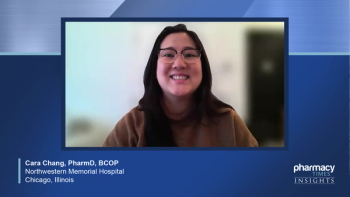Articles by Cara Chang, PharmD, BCOP

A panelist discusses how emerging advancements in non–small cell lung cancer (NSCLC) treatment include the anticipated FDA approval of subcutaneous amivantamab, which would significantly reduce infusion-related reactions seen in the MARIPOSA trials while improving patient experience and reducing infusion center chair time, as well as promising antibody-drug conjugates like sacituzumab govitecan (Trodelvy) that may provide better first and second-line treatment options with potentially less toxicity than current standard regimens.

A panelist discusses how pharmacists contribute to multidisciplinary care for patients with non–small cell lung cancer (NSCLC) by providing comprehensive education, creating customized medication calendars, ensuring appropriate dose adjustments for individual patient factors, advocating for patients to balance efficacy with toxicity management, and helping patients navigate insurance systems to access expensive medications through assistance programs, particularly when transitioning from targeted therapies to more complex regimens.

A panelist discusses how implementing new clinical trial findings into practice involves multiple challenges including operationalizing treatment regimens in electronic medical records (EMR), procuring medications, obtaining formal approval through institutional committees, and, most significantly, securing insurance approval since insurers often update their formularies less frequently than FDA approvals occur, which can delay patient care.

A panelist discusses how combining therapies for EGFR-positive non–small cell lung cancer (NSCLC) increases both benefits (improved progression-free survival, response rates, and duration of response) and adverse effects, emphasizing that treatment selection should consider patient-specific factors like central nervous system (CNS) metastases, performance status, treatment aggressiveness preferences, and real-world limitations where patients often differ from clinical trial populations in terms of organ dysfunction, concomitant medications, and previous treatments.

A panelist discusses how recent clinical trials for EGFR-positive non–small cell lung cancer (NSCLC) have expanded treatment options beyond single oral agents, with studies like FLAURA2, MARIPOSA, and PAPILLON demonstrating significant improvements in progression-free survival for combination therapies such as osimertinib plus chemotherapy and amivantamab plus lazertinib, though these combinations often come with higher rates of toxicity, discontinuation, and adverse effects compared to monotherapies.

A panelist discusses how waiting for molecular testing results before initiating treatment for non–small cell lung cancer (NSCLC) is crucial because patients with EGFR mutations can avoid chemotherapy and immunotherapy in favor of targeted oral agents like osimertinib, which offer survival benefits with minimal toxicity compared to traditional treatments, while premature immunotherapy could cause severe immune-related adverse events that might preclude later use of more appropriate targeted therapies.

A panelist discusses how non–small cell lung cancer presents significant treatment challenges due to its prevalence, high mortality rate, poor 5-year survival outcomes, and the difficulty of managing patients with advanced disease who often have poor performance status and multiple metastases, emphasizing the importance of pharmacist involvement for proper dosing, growth factor support, and comprehensive patient education about chemotherapy.

